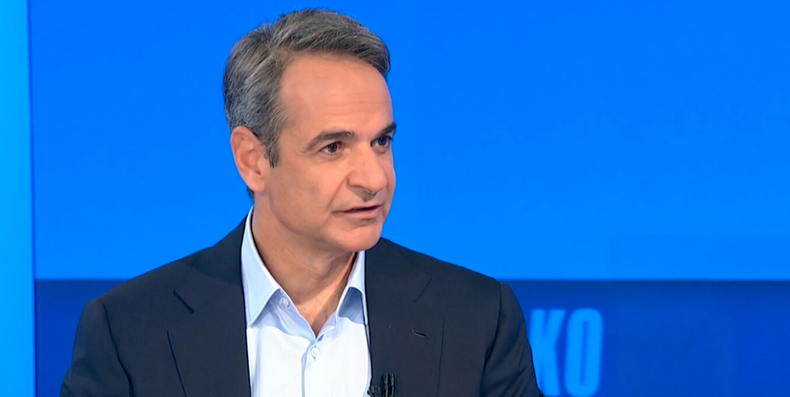By Tina Mandilara
Before Conor Gearty appeared in public dialogue, there were limited discussions taking place on human rights. Initially, rights were exclusively in the domain of justice issues, transactions, defending people before the law and were analyzed in purely legal terms – especially in the framework of academia. They had no universal power and, basically, they did not address the main political, social and other issues that are directly linked to any talk of Democracy. Managing to radicalize public dialogue on Human Rights, but also their practical application in the United Kingdom – where, amongst other places, he was invited to act as government adviser – the human rights justice professor and director of the Human Rights Center of the London School of Economics and Political Science (LSE) spoke on a number of issues such as terrorism, religion and justice etc. when he was in Athens a few days ago. He appeared at the Athens Concert Hall, for a lecture as part of an interesting debate on “Rule of Law” and human rights in a round table discussion that included the participation of Constitutional Law Professor Nikos Alivizatos as panel member. It was chaired by Kevin Featherstone, Modern Greek Studies Professor of the LSE and Director of the Hellenic Observatory. The lecture was organized by Megaron Plus and the LSE in collaboration with the Hellenic Alumni Association of the London School of Economics and the Hellenic Observatory.
Prior to the lecture, the Irish lawyer agreed to speak with us on human rights today following the attacks in Paris at a time when Europe is being challenged by the refugee flow and its own framework of principals.
– On the occasion of your lecture concerning the Rule of Law and human rights, to what extend do you believe that it reinforces or places the principle of Democracy, but also Democracy itself, into question?
The truth is that both terms, Democracy, as much as the Rule of Law, have – to a great extent – today lost their meaning. Recently, I published a book titled “Liberty and Security” where I speak of the ‘new democracy’ and the ‘post- democratic’ world we live in. In this world, one has a spectral image of democracy as well as the rule of law – just as for human rights. Reality is, however, starkly different and doesn’t seem to be dominated by or prevail over spectral images. Sometimes it appears to be overshadowed by some unforeseen condition, such as a military coup – as had been the case in the past – or by its very meaning as there are many times when democracy is literally devoid of meaning. Hence at this point, I see democracy and rule of law being intermingled. In regards to the matter you put forth in your question, I have the feeling that courts, occasionally seek to strengthen certain decisions in their sometimes weakened role while governments in office are unable to impose empty concepts in courts. In such cases, there is a conflict between the way courts perceive the rule of law and they way that governments desire to apply these.
– Don’t you believe, however, that the way in which the rule of law is perceived has to do with the way it pans out in different legal systems, such as those of the United Kingdom or Europe? For instance, the rule of law in the United Kingdom appears to be dominant, whereas here it seems to be an abstract principle within the confines of the Constitution. I’m not even sure that in Greece, the rule of law can be understood as a concept. What is your opinion?
I will speak from my own experience, especially regarding the law, through my expertise as a lawyer. In many cases, the rule of law is comprehensible as law, especially in countries such as Germany where there is a dominant prevalence of law. Elsewhere, however, emphasis is given on its moral side and hence it is analyzed in relation to the concept of Justice. I think, however, that any democratic system needs to define the meaning of justice on its own and to find its own interpretation rather than leave that to the judges. Responsible for such matters, especially when it comes to rights, are parliamentary decisions and these need to decide on issues, such as women’s rights for instance, rather than courts.
– So do you believe that the rule of law needs to be reflected in the Constitution of each country and validated there?
In England, this in essence can’t happen as there is no Constitution and that is a dual-edged sword. On the one hand, it is good to have a country with independent bodies, such as judges that can evaluate the country’s system when it isn’t corrupt, but on the other hand, what can be dangerous is the extent to which these institutions are privy to or purposely seek to dominate the public and political sphere.
-What happens, however, when the system is corrupt? In Greece, it is known that corruption creates problems for the independence of not just judges but of justice itself. To what extent can we speak of the rule of law in a country with a high rate of corruption, such as ours?
I don’t know the case of Greece very well. If I judge, however, from Ireland, those who criticize corruption are often the very people who are responsible for it. Last summer in Ireland, for instance, an employee who gives entire lectures against corruption is the same one who did not offer me a receipt! Naturally, he could not innately perceive that he, too, is part of what he criticizes. But the truth of the matter is that I have had no parallel image of Greece – until now, where I have received a warm reception from people and kindness. Furthermore, I have the impression that this government is new and wants to battle corruption, isn’t that so?
– Nobody knows how much and to what extent the government wants to battle corruption. What is evident is that corruption in Greece has deep roots and probably has to do with the social reflexes of the place and an entire mentality. To what extent do you really believe that any government can infiltrate deeply-rooted innate concepts?
This would have to happen at a state level and it is important to occur immediately. They had invited me to Rwanda once, as a consultant, and I had met with the President, etc., where it was pinpointed as important by themselves and the country to fiercely clamp down on matters of corruption. I remember, for instance, someone at the airport approach a girl from our delegation and ask for her to play a part in an illegal money transfer to somewhere. The result was that the employee immediately lost his job, and when the girl expressed her regret over the incident, the President was adamant that if corruption begins then it never stops. That was his view. The result is that Rwanda now has a reputation as one of the least corrupt states in contrast, for instance, with Russia that most believe gives the impression of a corrupt state. Hence, the reputation of a state is important and more significant than what actually happens, and for this reason each government needs to turn around the image by actively bringing real and symbolic change. It would be important for the current Greek government to proceed by making a symbolic move in the case of corruption.
– Apart from your role as a university academic and lawyer, you have been an adviser to many governments, so, what would you advise the current government? What would you consider to be its greatest asset? In England, you are credited with having contributed to an entire Human Rights Act.
For starters, it is important to have different designations and it so happens that I advise state factions while also writing a newspaper column in favor of activism. It couldn’t happen differently and I think it is good to combine different attributes. What I consider to be the rule is that they all be done with consistence, and especially, with integrity.
– What do you really believe about human rights in Europe today, especially after the terrorist attack in Paris? Do you believe that there is a danger that things will change drastically?
We’ll see. Nobody knows. First we had Madrid – in 2000 – and later London – in 2005 – and now Paris. I believe that it is important that there were public gatherings in Paris immediately afterwards, just as it was important that crowds gathered to watch the friendly game between England and France whereas two weeks later the Paris Climate Change Conference took place. In my book, “Essays on Human Rights and Terrorism”, I stress the importance of such gatherings in the aftermath of a strike so that there is the reinstatement of an elementary predictable normalcy. The matter of public gatherings in a climate of fear is traumatic, but it is important that this be done immediately. And it is very good that this is happening right now in France.
– Aren’t you concerned by the Anti-Terorrism law being formulated in France but also Europe?
There was always a conflict of interest in the framework of the very government formation whether this is set by the law or public opinion, or from whatever appears to threaten and destroy it. And destruction can give rise to opportunity for the governing power to reinforce its jurisdiction, bearing in mind what happened on September 11 in the United States where many politicians advised Bush and rushed to widen their responsibilities, whereas in Britain, the level of surveillance was upgraded. Surveillance is strong in the United Kingdom and it is natural that these mechanisms multiplied when authorities sensed danger. Conclusion? Power does nothing more than strengthen its own obsessions related to what constitutes danger and seeks to exploit its position by reinforcing it as best it can. Criminal actions always help leaders because they manage to exploit these in relative ways. Look at how Hollande managed to strengthen his role and image in just one week.
– In what way, really, do you think that nations become more afraid or turn inwards due to terrorist strikes? Do you think that Europe is changing after the terrorist attacks in France and is losing the fabric of its universal and joint character.
There is such debate. I saw, for instance, that some said that Greece is under threat of exiting the Schengen Area. Perhaps France will be the last strike in an already injured Europe, but let’s wait and see. The refugee situation is playing a special role, as the former communist bloc is taking a reactionary stand. It is too soon to say whether the European foundations are under threat, but it would certainly be inappropriate to say that the Schengen Treaty is being abolished as this constitutes its very heart.
– What are you afraid of the most?
I’ll be honest: On the one hand we have Universities, the world of the free movement of ideas, the Magna Carta etc. That’s brilliant and necessary to a degree when we talk about freedom, but what happens from there? In essence, what we are doing is letting money determine the courts, public discourse and how we see things. Soon, we will say that we are free but people will have lost their rights in practise. We will only have corporate decisions that will define the law, common good, and justice as things constantly lose their radical universalism. I’m afraid that we may begin to consider things only as the wealthy would want us to and create a dystopian universe in the future. So that’s what I fear most of all.





































